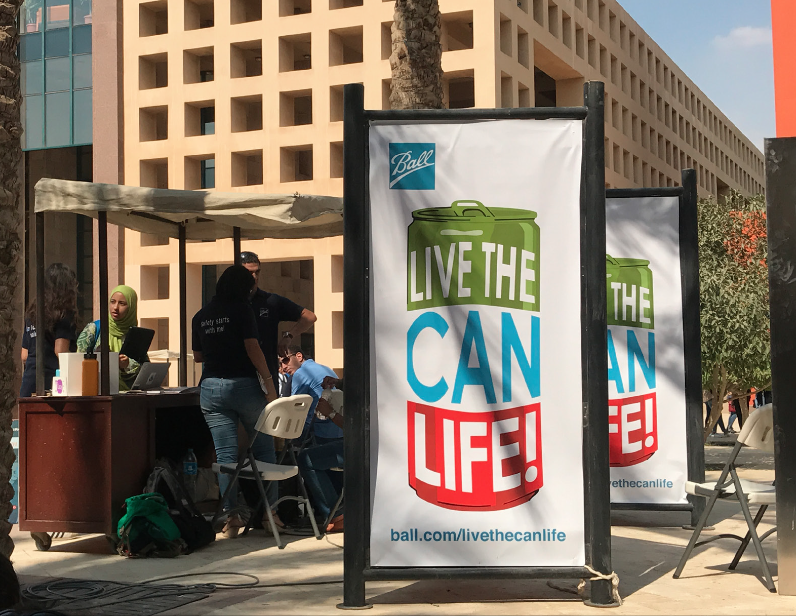By: Sara Mohamed
Follow @saraaashraf3
In an attempt to promote green initiatives at AUC, the Office of Sustainability invited representatives from packaging giant, the Ball Corporation, on September 27 to share their environmentally friendly processes.
Ball Corporation is a worldwide major manufacturer of beverage, food, and household packaging.
The company also provides services to commercial and government customers in other fields, such as aerospace.
Representatives from Ball Corporation revealed that the company reduced its total carbon footprint, an indicator of greenhouse gases emitted by human activity, by 25 percent through its use of recycled cans.
“Almost 80 percent of our produced volume is recycled by El-Zabaleen [the garbage collectors] who later export their output to France,” Bassem Mohsen, human resources manager at the company, told The Caravan.
“El-Zabaleen collect the garbage from the residents in Cairo and later recycle them in their neighborhood.”
The company encourages aluminum recycling because it saves 92 percent of the energy required to produce virgin aluminum from hazardous chemicals, while considerably cutting down carbon emissions.
“The process itself doesn’t take much [time]. In just 60 days, cans can be recycled and returned to a store shelf as new cans,” said Ahmed El-Adawy, environmental and health manager at Ball Corporation.
“We promote sustainability not only through recycling of materials, but also through the usage of water, electricity, and all of the utilities of our labs.”
In April, AUC published its new carbon footprint report, showing trends for the past five years.
The report includes the annual total emission of significant greenhouse gases into the atmosphere in respect to daily activities and campus operations.
This made it the first higher education institution in the Middle East and North Africa to conduct a carbon footprint study of its own impact on climate change.
The report indicates that the campus’ carbon emissions increased by 5,286 MT CO2e – around 13 percent – since last year.
The two sectors that showed a sharp increase were transportation and refrigeration, which increased by 82 percent and 41 percent, respectively.
“This is because the number of private cars on campus keeps increasing annually as well as campus operations and activities,” said Yasmin Mahmoud, AUC’s sustainability officer.
Comparatively, however, AUC’s energy use is considerably less than those of similar sized institutions in the US.
The report also showed the initiatives developed to reduce energy use such as improving management of the air-conditioning system and ventilation, reducing lighting consumption and developing a focused approach to overall energy use.
“AUC students could help in developing a more sustainable campus through carpooling riding the bus, and duly use [of] the recycling bins,” Mahmoud said.
AUC promotes sustainability by providing a solid recycling infrastructure on campus. There are 13
full sorting stations and 30 mini-sorting stations around campus.
Different bins are labeled for food, aluminum cans, plastic, or trash disposal.
“We try to encourage our students to become sustainable through events such as Earth Week, campaigns, and spreading awareness as much as possible,” Yasmin told The Caravan.
